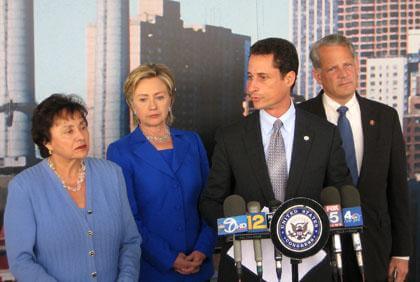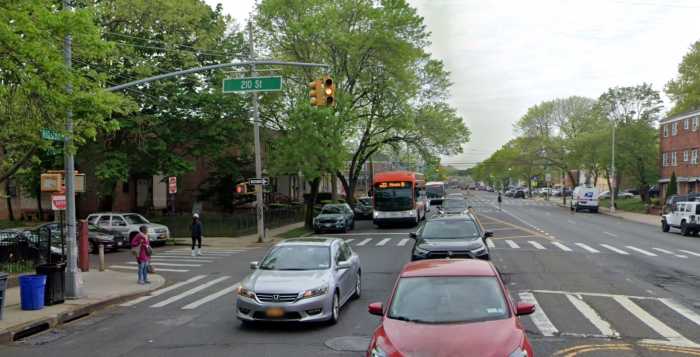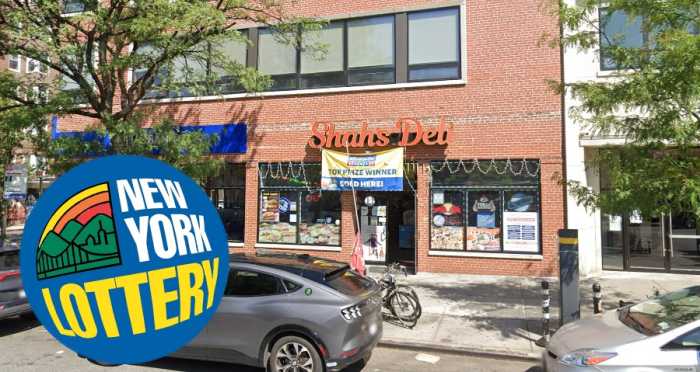By Jeremy Walsh
A group of angry New York Democrats returned from Washington, D.C., Monday evening after Congress failed to pass a $700 billion financial bailout bill expected to help avert a total meltdown on Wall Street.
Many Queens residents, too, were disappointed to learn that the bailout plan, now in the works for two weeks, had once again failed.
House Republicans voted 2-to-1 against the package, which President George W. Bush, Treasury Secretary Henry Paulson, Federal Reserve Chairman Ben Bernanke, both presidential candidates and legislative leaders from both Congressional houses urged their caucuses to pass.
It failed by a margin of 228-205. Half of House Democrats voted in favor of the bill.
“They put ideology first and the taxpayer last,” fumed U.S. Rep. Gary Ackerman (D-Bayside). “… They're saying this is a bailout of Wall Street, but this is a bailout of Elm Street and Bell Boulevard. This is every street in America we are bailing out.”
U.S. Rep. Anthony Weiner (D-Forest Hills) attacked the 133 Republicans who opposed the plan and lashed out at Republican presidential candidate U.S. Sen. John McCain (R-Ariz.), who was said to have been making calls to convince his colleagues in the House of Representatives to back the plan.
“He must have a very small Rolodex,” Weiner told a news conference at LaGuardia Airport.
House Republicans blamed their opposition to the plan on House Speaker Nancy Pelosi (D-Calif.), saying her speech before the vote was too harshly critical of Bush's economic policies.
The Dow Jones Industrial Average plummeted 777 points Monday as traders watched for a sign that the bill would pass, the worst decline since the crisis of 1987.
“As the number of Republicans voting went up, the Dow went down,” said U.S. Rep. Steve Israel (D-Hauppauge).
But the market recovered much of its losses Tuesday, with the Dow climbing more than 485 points at the close.
Congress was expected to reconvene Thursday after the Jewish holidays to start working on a new version of the bill.
“There will be plenty of time to figure out what went wrong,” said U.S. Sen. Hillary Clinton (D-N.Y.), who appeared with Weiner and Israel at the news conference. “But we now have to go back to the drawing board.”
All Queens House delegates voted for the bill Monday.
Weiner said it was not an easy decision and attacked the majority of House Republicans for casting what he regarded as politically expedient votes.
“It was going to be very difficult to get 50 percent of Democrats to vote for this,” he said. “Sixty percent is a landslide in a situation like this.”
Weiner said many of his colleagues and constituents were angry at Wall Street for the irresponsible financial behavior that started the crisis.
“[They were saying,] 'Why should we listen to what they say? This administration has less than zero credibility on the economy.' We stipulated to all that. No one is arguing that. The question is: Can we do nothing in a situation like this? That same conversation simply wasn't happening in the Republican caucus.”
In Queens, many residents contacted by the TimesLedger supported the failed plan.
“I think it's necessary to pass it,” said Bayside resident Scott Michaels. “I think the reason they haven't passed it is because congressmen want a bill to pass but they do not want to vote for it. They don't want to anger their local constituents, but I think everyone knows something needs to be done by the government.”
Queens Village resident Carleene Cannon, 41, said the plan would have helped right the economy.
“When I heard it, the first thing I thought was, “What?” If the Republicans can't get their own side to vote for something, what they expect us to do? I don't know where they came from with that.”
With the failure of the bill, Clinton predicted unemployment in the state would go up dramatically this week, noting she had spoken to one major homebuilder who had just laid off 2,000 employees.
Clinton said she expressed reservations about such a tremendous bailout, but likened the situation to treating a badly injured driver whose reckless behavior caused a chain-reaction accident.
“You've got to stop the bleeding,” she said. “You've got to take care of the patient.”
Weiner and Ackerman agreed that the Republican opposition may have been driven by a public backlash against the notion of the taxpayer rescuing financial institutions from their own misdeeds.
A USA Today/Gallup poll taken last week showed that 22 percent of those polled said they wanted Congress to pass a plan similar to what the Bush administration proposed, 56 percent wanted Congress to pass something different and 11 percent wanted Congress to take no action at all.
“Most of the country doesn't have Wall Street,” Ackerman said. “The people are so shortsighted on this. New York is the economic engine of the country.”
Closer to home, state Comptroller Thomas DiNapoli said Monday that the recent upheaval on Wall Street could cost New York state up to $3.5 billion in tax revenues by March 2010. He said the job toll in the financial securities industry could be as high as 40,000, up from an earlier estimate of 25,000.
Also on Monday, state Assembly Speaker Sheldon Silver (D-Manhattan) called on the Assembly Ways and Means Committee to hold statewide public hearings to gauge the fiscal impact of the national economic crisis on working families, businesses and communities.
Nathan Duke and Ivan Pereira contributed to this story.
Reach reporter Jeremy Walsh by e-mail at jwalsh@timesledger.com or by phone at 718-229-0300, Ext. 154.



































